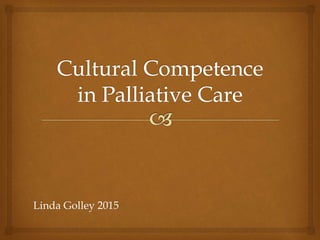
Cultural Competence in Palliative Care
- 2. Goals reflect core values and identity consist of what is desired and what is to be avoided Needs coping toolbox consist of information flow, control over events and decisions, access to people and resources, connection back to normal life Preferences what annoys and comforts consists of food, clothing, mementos, environmental design Culture in Health Care
- 3. Ask the patient Use your knowledge of world and current events to be sensitive Use your experience as a health care worker to be sensitive to possible personal tender points Use clues of behavior, comments, visual statements of identity as a doorway to knock on, not as a proxy for asking Keys to Eliciting Patient’s Cultural Landscape
- 4. Scenario: You have ALS at age 40. You are in hospice care and very weak, but compos mentis. Pain from weight of head, discomfort from not eating. Goals: what is desired, what is to be avoided Needs: information, control, access, tools, resources Preferences: comforts and annoyances Exercise: Your culture as a palliative care patient
- 5. Goals: Are we aligning his treatment plan with his desires and protecting him from what he fears? Needs: Are we checking to make sure that he has what he needs from us to cope as well as possible? Preferences: Are we alert to what he would like for comfort and to what he gets annoyed about? For each patient:
- 6. Woman with metastatic CA in hospital bed, prognosis of weeks Family has insisted for past year that word tumor be used instead of cancer, very controlling of all communication with care team Nurse is alone with patient for a few minutes, patient asks her what is really going on Issues of culture: decision making pathways, control of care, access to information, assumptions of family and of care team regarding patient’s goals, needs, and preferences Scenario A
- 7. 38-year old male gay patient dying on inpatient unit of CA, has been on unit for a month aged mother arrives from distant city, aware that situation is serious mother refuses to accept death as possibility, is very hostile to team discussing this, plants herself in room mother refuses to allow longterm male partner to visit, acts out and bullies patient if he appears, partner stops coming to visit, patient is depressed Cultural issues: family dynamics around challenging mother, homophobia of mother, denial of Dx, fear of jinx, religious faith of mother, issues of access to and by loved one. Scenario B
- 8. 67 year old male patient dying of liver cancer and multiple organ failure, prognosis 1 to 3 days, inpt. patient has internal blood loss, very low perfusion patient wants to survive a day more for son’s arrival from distant place team offers one transfusion to allow survival for a day, patient accepts when alone with team and interpreter, after discussion wife is Jehova’s Witness, opposed to blood products, also emotionally distant from patient wife attacks patient verbally for agreeing to transfusion and tells him he is dying and does not need any more interventions, accuses team of pushing transfusion Cultural issues: Decision-making pathway, goal of patient, goal of wife. Scenario C
- 9. Elderly male patient slowly recovering from stroke, may go home eventually IF he becomes able to do ADLs patient repeatedly hears care conferences, but does not make any move to feed himself, wash himself, or become more mobile or do ADLs. family feeds patient, supports patient while ambulating, washes him, tells care team he cannot do things himself care team cannot discharge, but no medical reason to keep forever on unit Cultural issues: identity of patient in family unit, goals of patient, goals of family. Scenario D